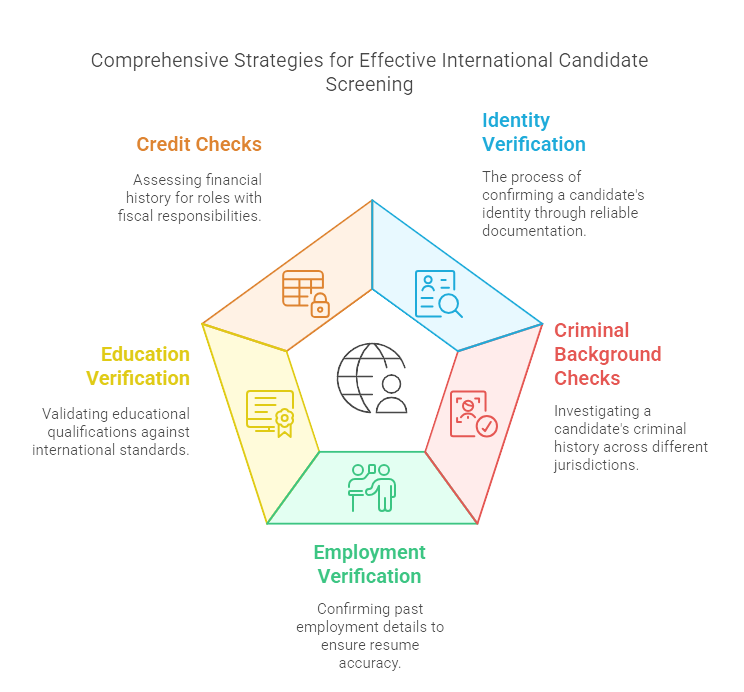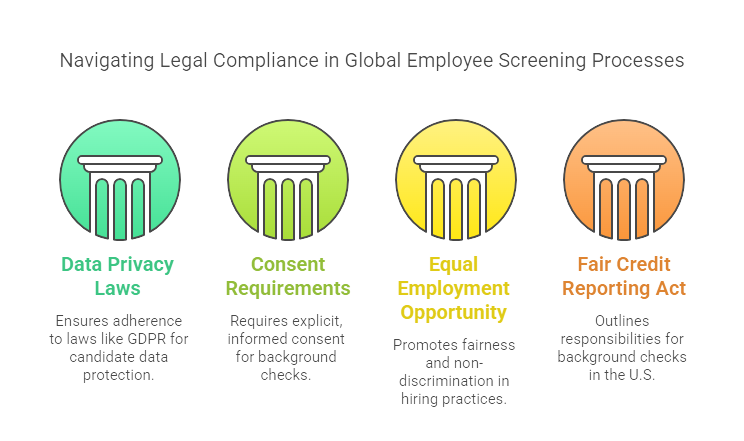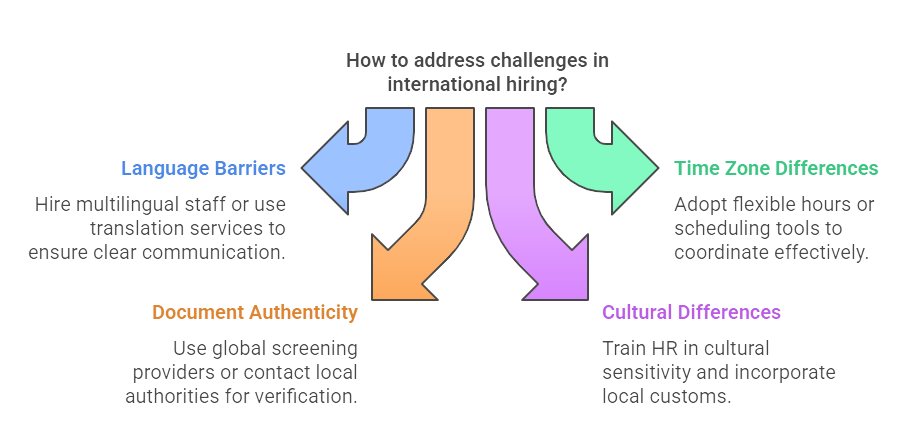Hiring internationally expands your talent pool, bringing unique skills and perspectives into your organization. However, the process isn't without its challenges, particularly when it comes to conducting background checks on international candidates. This guide aims to demystify international hire screening, provide best practices, and highlight key legal considerations.
Key Takeaways
- International hire screening is essential for mitigating risks, ensuring regulatory compliance, and maintaining workplace safety.
- Effective screening methods include identity verification, criminal background checks, employment verification, and education verification.
- Data privacy laws, such as GDPR, require companies to obtain explicit candidate consent and handle personal data transparently.
- Partnering with experienced global screening providers can streamline the process and ensure compliance with international regulations.
- Standardizing your screening process and maintaining comprehensive records are crucial practices for a smooth and effective hiring process.
Introduction
In an increasingly interconnected world, organizations are breaking geographical barriers and extending their recruitment efforts globally. As companies seek to tap into the global talent pool, the advantages are evident: diverse perspectives, specialized skills, and innovation potential. However, hiring international employees also introduces a layer of complexity, particularly in conducting comprehensive and compliant background checks.
International hire screening, while vital, can seem daunting due to varying legal frameworks, cultural nuances, and logistical challenges. It's not merely a box-ticking exercise; it's a critical step to ensure that the individuals you bring into your organization are who they claim to be, possess the qualifications they advertise, and align with your company's values and safety standards.
This article aims to unravel the complexities of international hire screening. We’ll walk you through the process, offering best practices and highlighting legal considerations to help you navigate this intricate landscape with ease and responsibility. Whether you’re an HR professional or a business owner, this guide will equip you with the knowledge and tools necessary to screen international candidates effectively and compliantly.

Why Is International Hire Screening Important?
International hire screening is non-negotiable in today’s global employment landscape. Here's why you should prioritize this crucial step.
EXPERT INSIGHT: As an HR professional working with cross-border talent, I've realized that global hiring isn't merely about expanding reach but doing so responsibly. Every time we welcome a talent from the opposite end of the globe, we owe something to our people and our future to get it correct. Global screening isn't box-checking; it’s how we build trust between borders, keep people safe, and demonstrate the values we teach. It’s complicated, sure— but with focus, cultural nuance, and the necessary tools, it’s also a fantastic opener for a more diverse workforce where people from around the globe bring their best. The desire isn’t merely that we should be hiring around the globe—it’s that we should be doing so with care, with ethics, with compliance. - Charm Paz, CHRP
Risk Mitigation
International hire screening is your first line of defense against fraud. It helps weed out candidates with falsely embellished resumes or those hiding criminal pasts. Without it, you run the risk of onboarding individuals who could compromise your organization's integrity and security. Whether it's validating academic qualifications or uncovering undisclosed criminal activities, thorough screening ensures you know exactly who you’re hiring.
Regulatory Compliance
Every country has its own set of laws and regulations, and when you hire internationally, you need to be compliant with all relevant jurisdictions. International screening ensures you’re not inadvertently breaking any laws, whether it’s the EU’s General Data Protection Regulation (GDPR) or the Fair Credit Reporting Act (FCRA) in the U.S. Adhering to these regulations isn't just about avoiding fines—it’s about maintaining your company's reputation and fostering trust.
Workplace Safety
A secure workplace is one where everyone feels safe. Screening international hires helps maintain this environment by ensuring that potential employees do not have backgrounds that could pose a threat. It's about more than just physical safety; psychological safety hinges on knowing that every colleague has been vetted and is trustworthy. This promotes a culture of security and well-being, which is foundational to any successful organization.
In essence, international hire screening isn't just a box to tick. It’s an investment in the safety, legality, and integrity of your business.
Types of Checks in International Hire Screening
Identity Verification
Verifying an international candidate's identity is your first checkpoint. This can get tricky due to varying document standards across countries. Passport validation is the most reliable method. Other documents like national ID cards or driver’s licenses can also be used, but you’ll need to ensure they're legitimate. Partner with global verification services that know the local documentation rules to avoid falling for fake IDs or altered documents.
Criminal Background Checks
Running criminal background checks globally isn't straightforward. Different countries have varying levels of accessibility to criminal records—and not all countries share this information readily. You'll need to navigate a web of local databases, national police records, and international watch lists. Make sure you respect legal requirements in each country regarding what information you can access and how you can use it. An experienced global screening provider can streamline this process significantly.
Employment Verification
Checking a candidate's past job roles and responsibilities can uncover discrepancies in a resume. Employment verification becomes a manual task if an international employer doesn't have a standardized system for employee records. Contacting previous employers is a start, but language barriers and differing employment conventions can complicate things. Utilizing employment verification services with multilingual capacities and deep knowledge of regional job markets can help avoid these pitfalls.
Education Verification
Educational qualifications vary widely, and verifying them can be a minefield of accreditation standards and document formats. Credential evaluation services can determine if a foreign degree meets your country's standards. Directly contacting educational institutions or using specialized verification services ensures that purported qualifications hold weight.
Credit Checks
Credit checks might be essential for roles with fiscal responsibilities. However, not all countries have credit report systems, and privacy laws may restrict access to such data. Conduct credit checks only if necessary and be well-versed in local regulations to avoid legal issues. Again, a seasoned global screening firm can guide you on what’s permissible.
Properly conducted, these checks can provide comprehensive insights, ensuring you make informed and secure hiring decisions.

Legal Considerations
Navigating the legal landscape of international hire screening can be tricky, but it's essential to keep your organization compliant and above board. Here’s a rundown of what you need to consider:
Data Privacy Laws
First and foremost, you must adhere to data privacy laws like the General Data Protection Regulation (GDPR) for candidates in the European Union. The GDPR is stringent about how personal data is collected, stored, and used, requiring explicit consent from the individual. Failure to comply can result in heavy fines and damage to your reputation. Ensure that your processes are transparent and that candidates are informed about how their data will be used and stored.
Consent Requirements
Obtaining explicit consent from candidates for background checks is not just a best practice; it's a legal necessity in many jurisdictions. This consent must be clear, specific, and informed. Candidates should know exactly what types of checks will be conducted and how the information obtained will be used. Document this consent carefully to protect your organization against potential legal challenges.
Equal Employment Opportunity
Fairness and non-discrimination are critical when conducting background checks. The Equal Employment Opportunity Commission (EEOC) provides guidelines that help employers avoid discriminatory practices during the hiring process. It’s important to apply the same screening criteria to all candidates, regardless of nationality, to ensure compliance with equal employment opportunity laws.
Fair Credit Reporting Act (FCRA)
For U.S.-based employers, the Fair Credit Reporting Act (FCRA) outlines your responsibilities when running background checks, including those for international candidates. Key points include notifying candidates of your intention to conduct a background check, obtaining their consent, and providing them with a copy of the report if adverse action is to be taken. Familiarize yourself with FTC guidelines to ensure you stay compliant with FCRA requirements.
By keeping these legal considerations in mind, you can create a robust and compliant international screening process. Remember, staying informed and up-to-date on legal requirements will help mitigate risks and foster trust with your prospective international hires.

Best Practices for International Hire Screening
Partner with Global Screening Providers
Utilizing experienced global screening firms can save time and provide peace of mind. These providers are experts in navigating the complexities of international laws, databases, and verification processes. They offer comprehensive services ranging from identity checks to employment verifications, tailored to different regions. Their expertise ensures that you get accurate and reliable information while staying compliant with international regulations.
Standardize Your Screening Process
Consistency is key when screening international hires. Develop a standardized protocol that applies to all candidates, regardless of their country of origin. This might include a uniform checklist of required documents, specific types of checks to be performed, and a sequence for conducting these checks. A streamlined process not only ensures fairness but also makes it easier to track and compare candidates.
Verify Sources
When verifying the credentials of international candidates, using reputable sources is crucial. Diplomas, employment records, and other documents should be cross-checked with trustworthy databases and authorities. Beware of institutions or employers that might have less stringent standards or those that may not be recognized globally. Leveraging official government databases or partnering with international verification services can help authenticate these records effectively.
Maintain Records
Proper documentation and record-keeping practices are essential for compliance and future reference. Maintain detailed records of each screening process, including consent forms, verification results, and communication logs. This documentation not only provides a clear trail for any necessary audits but also helps address any discrepancies that may arise later. Ensure that records are stored securely and comply with data privacy regulations, such as GDPR.
Challenges and Solutions
Language Barriers
One of the primary challenges in international hire screening is dealing with language barriers. When reviewing documents or conducting interviews, differences in language can lead to misunderstandings or missed details. The solution? Hire multilingual staff or employ professional translation services to bridge the gap. Using technology like translation software can also help, but human oversight remains crucial to ensure accuracy and context.
Time Zone Differences
Time zone differences can disrupt communication and delay the screening process. Coordinating interviews or verifying employment history can become a logistical nightmare if you're not mindful of these challenges. To manage this, adopt flexible working hours or use scheduling tools that can suggest optimal meeting times across different time zones. Prioritize asynchronous communication methods like email when immediate responses aren't necessary.
Document Authenticity
Verifying the authenticity of foreign documents and qualifications can be perplexing. Different countries have various standards for certifications and documentation, making it difficult to ascertain authenticity. Utilize global screening providers with expertise in international credentials to simplify this process. These providers often have established protocols and local experts who can validate documents effectively. Additionally, contacting local educational or professional bodies directly can offer another layer of verification.
Cultural Differences
Cultural nuances can play a significant role in international screenings, influencing everything from communication styles to the interpretation of responses. For instance, what is considered a normal delay in responding to inquiries in one culture might be seen as evasive in another. Training your HR team in cultural sensitivity can help mitigate these misunderstandings. Incorporating local customs and norms into your screening process exhibits respect and understanding, fostering better relationships with international candidates.

Tools and Resources
When it comes to international hire screening, the right tools and resources can make or break the process. Here are some key resources to keep your screening efficient and compliant:
Global Screening Services
Partnering with specialized global screening services can significantly ease your workload. Firms like HireRight and Sterling offer comprehensive international screening services that include identity verification, criminal background checks, and employment verification. These companies typically have established networks and methodologies for dealing with international databases, making them a reliable choice.
Government Databases
Leverage official government databases for accurate and authentic information. Websites like Interpol's database provide access to criminal records across borders, while other regional sites, such as Australia's National Police Check or the UK's Disclosure and Barring Service (DBS) provide localized criminal background information.
HR Software
Integrating HR software that specializes in international hiring can be a game-changer. Tools like GCheck offer features specifically designed to manage international candidates. These systems can handle everything from application tracking to compliance documentation, streamlining your overall screening process.
Professional Associations
Professional bodies like the Society for Human Resource Management (SHRM) and the International Association of Privacy Professionals (IAPP) offer valuable guidance and support. These organizations frequently publish best practice guidelines, host webinars, and offer certification programs that can help you stay up-to-date with international screening standards and legal requirements.
By leveraging these tools and resources, you'll be better equipped to navigate the complexities of international hire screening, ensuring a smooth and compliant process from start to finish.
Frequently Asked Questions (FAQ)
When screening global candidates, there will be some questions that have no correct answer. Cultural nuances, work history gaps, and address formats are just some of the complexities that complicate screening. To help get you ready for making confident strides, we have gathered the most common questions that cover the most common challenges in global screening. New to global recruiting or in need of an effective approach, these answers will position you for simpler, compliant screening.
How do I handle discrepancies in international address formats?
Discrepancies in international address formats can be challenging but are manageable with a systematic approach. Start by understanding the standard addressing conventions of the candidate’s country. Utilize international address validation tools or services to ensure accuracy. If uncertainties persist, directly communicate with the candidate for clarification.
Can I perform credit checks on international candidates?
Yes, you can conduct credit checks on international candidates, but the process varies by country. Local laws and available data differ, so it's crucial to partner with global screening providers familiar with these specifics. Ensure you have the candidate's explicit consent before proceeding.
What should I do if I can't verify a candidate's past employment?
If you encounter difficulties verifying a candidate's past employment, consider alternative methods like requesting additional documentation from the candidate or contacting former supervisors directly. You may also use professional verification services that specialize in international records.
How do cultural differences impact the screening process?
Cultural differences can significantly impact the screening process. Be mindful of varying norms around privacy, employment practices, and communication styles. Employ cultural sensitivity, possibly with the assistance of multilingual staff or local experts, to navigate these differences effectively and respectfully.
Conclusion
Thorough and meticulous international hire screening is crucial for mitigating risks, ensuring regulatory compliance, and maintaining workplace safety. By using effective identity, criminal, employment, and education verification methods, and respecting data privacy laws, you can build a robust screening process. Collaborating with global screening providers, standardizing procedures, and maintaining detailed records are key practices that will ensure a smooth and effective hiring process.
Fully embracing the opportunity to hire internationally allows your organization to benefit from a diverse array of skills and perspectives. So, approach this practice with confidence and diligence. Start refining your international screening processes today to secure top-tier global talent and fortify your workforce for future challenges.

